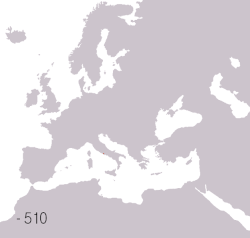Roman antiquity
| Ancient Rome | |||||
| Roma | |||||
|
|||||
|
Territories of the Roman civilization:
|
|||||
| Capital | Rome | ||||
| Languages | Latin | ||||
| Government |
Kingdom (753 BC–509 BC) Republic (509 BC–27 BC) Empire (27 BC–476 AD) |
||||
| Historical era | Ancient history | ||||
| • | Founding of Rome | 753 BC | |||
| • | Overthrow of Tarquin the Proud | 509 BC | |||
| • | Octavian proclaimed Augustus | 27 BC | |||
| • | Fall of Rome | 476 AD | |||
 |
|
|
|
Ancient Rome was originally an Italic settlement dating from the 8th century BC that grew into the city of Rome and which subsequently gave its name to the empire over which it ruled and to the widespread civilisation the empire developed. The Roman empire expanded to become one of the largest empires in the ancient world, though still ruled from the city, with an estimated 50 to 90 million inhabitants (roughly 20% of the world's population) and covering 5.0 million square kilometres at its height in AD 117.
In its many centuries of existence, the Roman state evolved from a monarchy to a classical republic and then to an increasingly empire. Through conquest and assimilation, it eventually dominated the Mediterranean region, Western Europe, Asia Minor, North Africa, and parts of Northern and Eastern Europe. It is often grouped into classical antiquity together with ancient Greece, and their similar cultures and societies are known as the Greco-Roman world.
Ancient Roman civilisation has contributed to modern government, law, politics, engineering, art, literature, architecture, technology, warfare, religion, language, and society. Rome professionalised and expanded its military and created a system of government called res publica, the inspiration for modern republics such as the United States and France. It achieved impressive technological and architectural feats, such as the construction of an extensive system of aqueducts and roads, as well as the construction of large monuments, palaces, and public facilities.
...
Wikipedia

